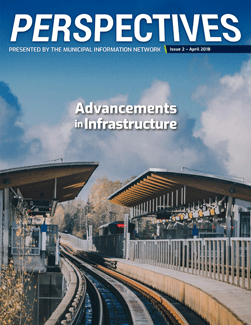First and most importantly—THANK YOU!
We were thrilled (and a bit astonished) at the wonderful response to our first edition of PERSPECTIVES. To the thousands of you who read the e-magazine, passed it along to colleagues, sent us a note or idea, shared an article with others, or simply read and enjoyed our first edition (and, we hope, learned something useful from it), thank you.
A couple of things to note: PERSPECTIVES is a free publication. When we ask you to subscribe it is just to protect privacy laws. There is no charge for you to receive this e-magazine. And no, you won’t be subjected to unwanted emails.
Second, anytime you want to communicate with us, share a story, make a suggestion, offer constructive criticism or an opinion, remember the direct email is: perspectives@municipalinfonet.com
Our main theme this month is Infrastructure. There is no issue more important to Canadian mayors and municipalities than the state of our infrastructure today—and who’s going to pay for what. Some provinces and territories are making promises of big infrastructure investments, and of course the federal government is on record with a $180B commitment. Municipalities want to see the money flowing.
The lead story is from Edmonton Mayor Don Iveson, who has been a leading proponent of smart infrastructure investments. He has been working closely with the Federation of Canadian Municipalities and is a real leader in Canada on this issue. His perspective on developing and investing in housing and other parts of the infrastructure deficit is a must-read.
We’re always looking for new, different and unique ideas to share in this e-pub, so the story from Innisfil, Ontario about how they provide public transportation is a really innovative concept. Technology even five years ago would not have permitted this method of moving people around this small, growing central-Ontario city. Their solution offers important lessons in how municipalities need to be smart, thinking ahead and prepared to be different.
A critical part of infrastructure is the management of those assets. The British Columbia Asset Management Association has been a leader in working with municipalities on their asset management for several years. The article by Wally Wells is a truly insightful look at this sometimes-ignored or misunderstood part of the infrastructure debate.
In my CIVIC COMMENT column, I argue that we need to expand the traditional definition of the ‘municipal infrastructure deficit’. As we get smarter about developing, building and running our towns and cities, it is obvious that local governments need to invest in things like broadband, airports, trees, libraries and the other amenities that make up the quality of life that residents want—but too often local officials don’t include them in their infrastructure planning or costing. We need to adopt a more holistic approach to infrastructure thinking.
Finally, for those of you heading to Halifax at the end of next month for the FCM conference, please note that the MUNICIPAL INFORMATION NETWORK will have a booth in the trade show. I will be there on Friday June 1, chatting with all of you about our e-magazine, signing books and looking forward to getting your ideas and comments about PERSPECTIVES. Please make sure you drop by the MIN booth and meet our team.
We hope you’ll enjoy our 2nd edition of PERSPECTIVES as much as our inaugural edition.
And please remember to keep in touch: perspectives@municipalinfonet.com
GORD HUME








